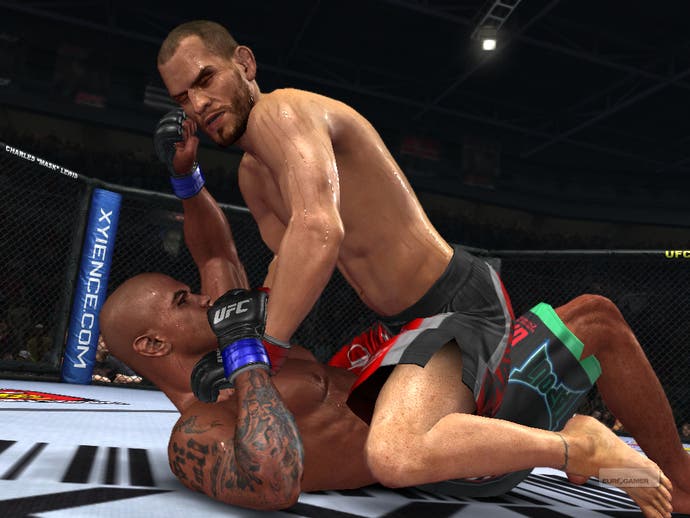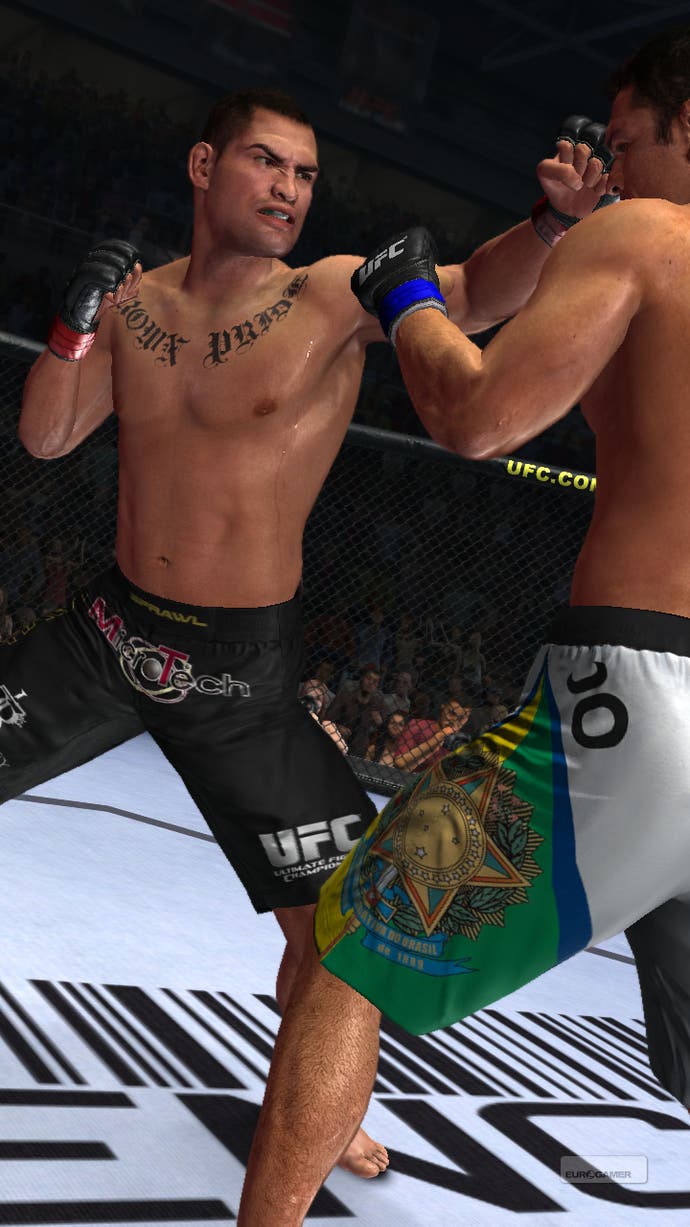UFC Undisputed 2010
Kick and mix.
UFC 2010's impressive roster of over 100 fighters (spread across five weight classes) is nothing short of exhaustive, featuring recent newcomers and old hands in force. But the gigantic range of different styles and abilities on offer is perhaps made most clear in the extensive Career Mode. The 10 minutes spent creating a fighter at the front end of the experience is the tip of the iceberg as, while it's here you set general stats - height, weight, lead fist preference - and the look and garb of your fighter, it's not until you start along the long road from amateur fights, through the World Fighting Alliance and into the UFC itself, that you begin to add tactical and stylistic meat to the bones.
Your career is divided into weekly chunks, the gaps in between scheduled fights open for you to train your fighter, rest up or visit various martial arts clubs. Training, mercifully, isn't tied to a mini-game, but is rather a pull-down option from a menu allowing you to put time into developing strength, speed or stamina. Here the game is one of juggling numbers, ensuring you maximise improvement between fights, while managing fatigue with proper rests so you don't enter a battle exhausted.
But it's in visiting training camps that you really start to customise your avatar. A slew of different martial arts houses (based on real life outfits) can be visited, each one offering a set of moves, which can be learned and incorporated into your fighter's palette of moves one by one.

To learn a move you must spar with a trainer, fulfilling certain criteria in order to fill a gauge to completion, at which point the move is learned and replaces your fighter's default attack. It's an ingenious system as it allows you to mix and match different styles at will, while immediately tailoring your proficiencies to suit your style, whether you want to put all your time into on-the-ground positions and submissions, standing attacks or clinches. By mixing and matching moves pulled from karate, judo, Brazilian ju-jitsu, Greco-Roman wrestling, boxing, Muay Thai and Sambo, your fighter has the potential to become a multicultural, multi-discipline combatant, an embodiment of the mixed martial arts philosophy.
A vast array of different modes and diversions helps to impart the essence of the sport, especially from the view of the fighters. While the menus are all 20-foot high gold lettering and orchestral hip-hop, and the historic matches are introduced by lithe girls Arianny Celeste and Chandella Powell, the game is refreshingly free of the presentational bluster that fighting games of this ilk so often pour their resources into. Pre-match theatrics are kept to a minimum and highlight reels are short and sharp in between bouts.

The commentary is near peerless in gaming, Mike Goldberg and Joe Rogan's incisive patois adapting to the on-screen action and adding immeasurably to it, no mean feat when every fighter in every weight class is distinguished from the next in profound ways and approaches. Outside of fights themselves, there's a distinct lack of polish: menu navigation is often needlessly convoluted (frustration exacerbated by the long load times) and the simplest of tasks, such as adding a sponsorship logo to your shorts in order to net some extra rewards in battle, can be tortuously long-winded. But these are cosmetic shortcomings, and underneath, the game's fundamentals are gold.
Since the success of last year's UFC game, MMA has become a serious proposition on the videogaming landscape. Where once EA shunned UFC President Dana White (allegedly saying, "You are not a real sport. We want nothing to do with this"), now they are close to releasing their own, no doubt highly polished MMA title.
Wisely, Yuke's has played to its strengths in the incoming shadow of such competition, making full and exciting use of the license that EA shunned to present a near-comprehensive UFC sim, layered expertly on top of a solid MMA core. It would be too generous to suggest this is the best recreation of the sport imaginable, as the rough edges and clunky navigation pull the game back from contemporary sheen. But it's close. And in sports videogames, that's the only metaphorical distance that matters.








